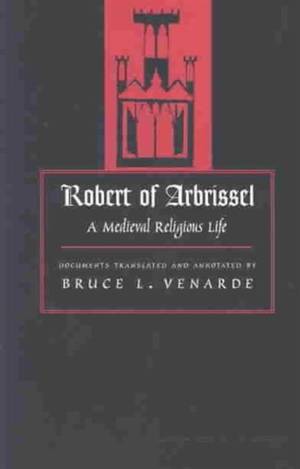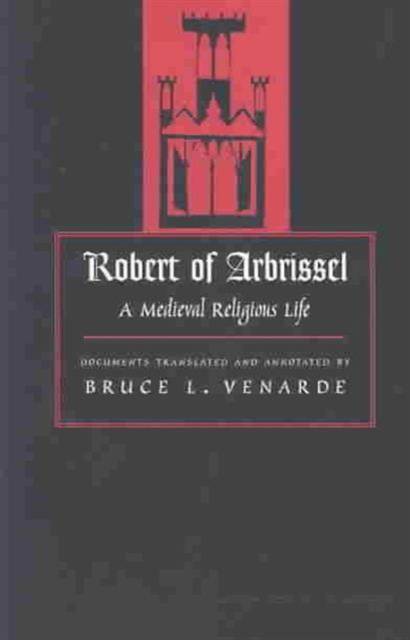
- Retrait gratuit dans votre magasin Club
- 7.000.000 titres dans notre catalogue
- Payer en toute sécurité
- Toujours un magasin près de chez vous
- Retrait gratuit dans votre magasin Club
- 7.000.0000 titres dans notre catalogue
- Payer en toute sécurité
- Toujours un magasin près de chez vous
Description
Contemporaries hailed the preacher and reformer Robert of Arbrissel (ca. 1045-1116) as a thunderclap of holy eloquence that lit up the Church--or they castigated him as a sponsor of sexual license. Robert has remained a controversial figure ever since, seen as a missionary to all manner of Christians, a heretic, a feminist, a founder of the ideal of courtly love, or a libertine. His preaching was so renowned that he was invited to speak before Pope Urban II; many were inspired to take up religious life after exposure to his charismatic asceticism and evangelical gifts. Best known as the founder of Fontevraud, a monastery for women and men in Western France that became the prosperous head of an order of nearly 100 religious houses, Robert of Arbrissel never became a saint.
Gathering the major medieval sources for the first time in any modern language, this book traces Robert of Arbrissel's multifaceted life from humble origins to dramatic death and burial. Two short biographies, Robert's one surviving letter, an account of Robert's preaching in a brothel, and two highly critical letters addressed to Robert together illustrate his activities, personality, and impact. The documents explore themes of reform, preachers and preaching, monasticism, patronage, literary genre, gender, and sexuality in a dynamic era of historical and cultural change. The translations are highly readable and the book is abundantly annotated with an introduction, thorough notes to each document, a map, and a chronology. Robert of Arbrissel: A Medieval Religious Life invites students and teachers of the Middle Ages and general readers to draw their own conclusions about this fascinating medieval holy man.
Translated writings included in Robert of Arbrissel:
Baudri of Dol, Life of Robert of Arbrissel
Andreas of Fontevraud, A Second Life of Robert of Arbrissel
Robert of Arbrissel's Writings
Marbode of Rennes, Letter to Robert of Arbrissel
Geoffrey of Vendôme, Letter to Robert of Arbrissel
ABOUT THE AUTHOR:
Bruce L. Venarde is Associate Professor of History at the University of Pittsburgh. He is author of Women's Monasticism and Medieval Society: Nunneries in France and England, 890-1215 (1996).
PRAISE FOR THE BOOK:
"The book as a whole is an exciting introduction to the religious problems of the eleventh century, when the clergy were suddenly cut off from marriage, while divorce remained inadmissible."--K. Janet Ritch, Modern Language Review
"The book will be of great use to its intended audiences, general readers and undergraduate students, giving them a vivid introduction to the social and institutional revisionings of western Christendom in the years around 1100. But the book has much for the more advanced student as well. The Introduction gives as elegant a survey of social trends in eleventh- and twelfth-century Europe as any I can think of, certainly within such a brief compass. The endnotes contain both basic facts for quick references and also some thoughtful discussions of biblical and patristic allusions that will pay detailed attention. . . . This is a slim and inexpensive book; its value is very large indeed."--Elizabeth Freeman, Cistercian Studies Quarterly
"This is an extremely welcome and user-friendly introductory guide to some of the complexities of the religious life of the age."--Dr. G. R. Evans, Church Times
"...An elegantly simple presentation of the major sources for Robert's life and career...Of a size and scope eminently well crafted for use in the classroom, this volume provides students and teachers of medieval history with an excellent case study in the history of Christianity." -- Thomas Head, H-France Reviews
"[Venarde's] faithful and accessible translation of the s
Spécifications
Parties prenantes
- Auteur(s) :
- Editeur:
Contenu
- Nombre de pages :
- 155
- Langue:
- Anglais
- Collection :
Caractéristiques
- EAN:
- 9780813213545
- Date de parution :
- 15-10-03
- Format:
- Livre broché
- Format numérique:
- Trade paperback (VS)
- Dimensions :
- 136 mm x 221 mm
- Poids :
- 267 g







